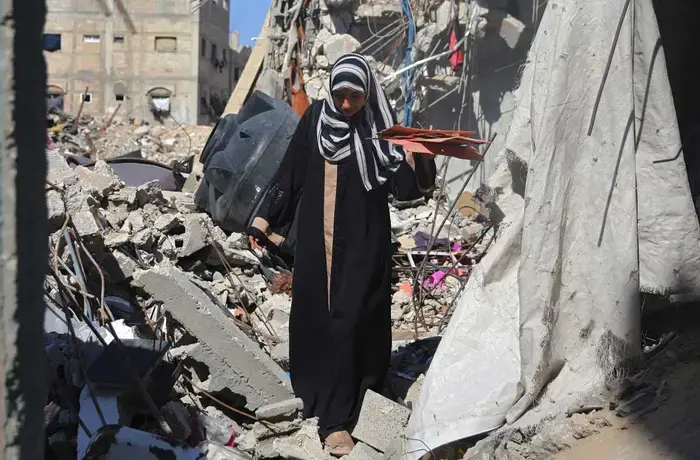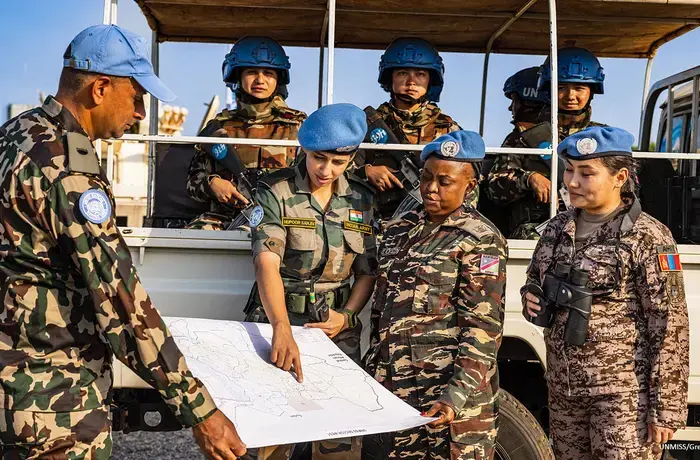Women, peace and security
Women all over the world lead movements to prevent conflict, mediate and restore peace, and rebuild their communities after a crisis. They have a right to participate in every issue and in every forum. Evidence confirms that women’s meaningful involvement makes peace agreements last longer, yielding benefits for communities and helping to heal social fractures.
Conflicts and crises are becoming more complex, violent and protracted. New threats exacerbate them, such as climate change and emerging technologies.
What has not changed: War, armed conflict, terrorism, and violent extremism have different and devastating consequences for women and girls. Yet women remain largely excluded from peace talks and other processes to end conflict and achieve justice. Most peace agreements lack specific provisions reflecting the priorities of women and girls, let alone their unique knowledge and experiences. Those from marginalized populations are both most at risk from conflicts and have the fewest resources to influence their resolution.
Women’s leadership is needed now more than ever. To support women’s advocates to push progress forward, this section of the knowledge hub explores the global agenda on women, peace and security. It offers a compendium of resources on eight core topics, including strategies and tips, perspectives, and experiences.
Quick refresh: What’s on the agenda?
The global women, peace and security agenda makes women and their rights central to all efforts to prevent, mitigate, build, and keep peace. Core elements include the Beijing Platform for Action, Convention on the Elimination of All Forms of Discrimination against Women (CEDAW), 10 United Nations Security Council resolutions starting with the landmark resolution 1325, and the 2030 Agenda for Sustainable Development.
Grounded in these commitments, the women, peace and security agenda builds on four pillars:
- Participation: Ensuring women’s meaningful participation in all aspects of peace and security efforts, from conflict prevention and resolution to peacebuilding and post-conflict reconstruction. This involves empowering women to engage politically, economically, and socially in decision-making processes at local, national, and international levels.
- Protection: Addressing the specific needs and vulnerabilities of women and girls in conflict-affected situations, including protection from gender-based violence, ensuring access to justice and humanitarian assistance, and promoting their physical and psychological well-being.
- Prevention: Recognizing the importance of addressing the root causes of conflict and promoting gender equality as a means of preventing conflict and building sustainable peace. This includes challenging discriminatory norms and practices that perpetuate violence and inequality.
- Relief and recovery: Supporting women’s roles as agents of change in post-conflict recovery efforts, including access to education, healthcare, economic opportunities, and social services. It also involves addressing the long-term impact of conflict on women and promoting their resilience and empowerment.



![The abuelas [grandmothers] of Sepur Zarco. Before the historic judgement was passed on the Sepur Zarco case in 2016, the grandmothers covered their faces to protect their identity as they experienced intense discrimination, and even rejection. Now they are regarded as respected elders and leaders in their community. Photo: UN Women/Ryan Brown.](/sites/default/files/styles/card_340_247/public/2025-10/crsv_sepurzarco_1200x800.jpg.webp?h=10d202d3&itok=Lpl-USfC)

![Women walk arm in arm in IDP [internally displaced persons] Site A, in Bentiu, South Sudan in 2023. Some of the women here have survived sexual violence. In this site, UNFPA, with the support of the CERF Fund, has set up a safe space for them, without men, so that they can recover and set up income-generating activities. Photo: OCHA/Alioune Ndiaye.](/sites/default/files/styles/card_teaser/public/2025-10/crsv_whodoeswhat_southsudan_ocha-ssd_gbv_bentiu-88_1200x800.jpg.webp?itok=XPBduXs3)
















